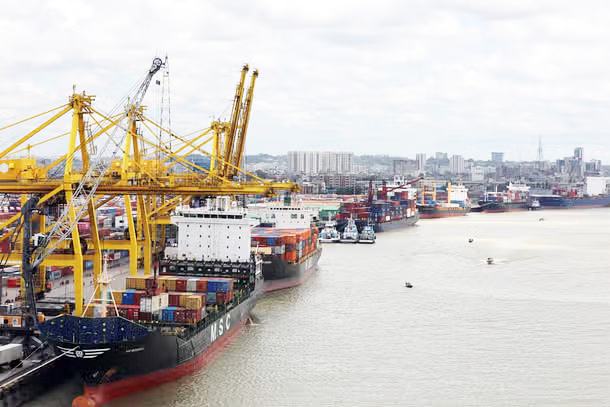Pakistan and Bangladesh’s direct maritime link signals improved relations and shifting strategic dynamics.
New Delhi: Earlier this week, a cargo vessel from Pakistan’s Karachi arrived at Chittagong Port, marking the first-ever direct maritime link between the two countries. The said cargo ship, according to reports, was carrying goods amounting to 2,300 TEUs (twenty-foot equivalent units), a unit of measurement used to describe the cargo capacity of shipping containers. Large container ships can transport more than 18,000 TEUs.
This docking is being viewed as a major step towards enhancing trade and business ties between the two Muslim-majority nations. It also serves as a testament to how Dhaka’s strategic views and goals have changed rapidly and significantly since the illegal overthrow of Prime Minister Sheikh Hasina in what is widely accepted as a colour revolution, followed by the installation of Mohammad Yunus as the caretaker Prime Minister.
The distance between Karachi port and Chittagong is around 2,600 nautical miles, and it takes approximately 10-12 days to cover the distance.
This development is particularly important because, until now, Islamabad had barred both private and government contractors from using Bangladeshi vessels. The only other countries on this list were India and Israel, highlighting Pakistan’s mistrust of Bangladesh until very recently.
As per a copy of the contract obtained by The Sunday Guardian, Pakistan Aeronautical Complex (PAC), a major defence contractor and aerospace manufacturer headquartered in Kamra, Punjab, which is wholly owned and sponsored by the Ministry of Defence Production, explicitly forbids the use of vessels bearing the flags of India, Israel, or Bangladesh for shipments to PAC. The contract also prohibits ships from stopping at any Indian port.
According to Section 15 (B)(b) of the standard contract, “If a Pakistan-flagged vessel is not available and/or delivery is likely to be delayed beyond the specified period, the supplier may ship the goods on C&F (Cost and Freight) basis on any available foreign-flagged vessel with the prior permission of the Directorate of Procurement, PAC Board Kamra, calling at Karachi as the first port of call in the South Asia Subcontinent. Under no circumstances shall shipment be made on an Indian, Bangladeshi, or Israeli vessel, or on a foreign-flagged vessel calling first at any Indian seaport en route to Karachi. Shipments on a foreign-flagged vessel will not be made on an FOB (Free on Board) basis.”
However, as the recent docking of the Pakistani ship shows, the dynamics are shifting rapidly now. The fact that Pakistan and Bangladesh have initiated their first maritime link indicates a softening of Islamabad’s stance toward Bangladesh.
The change in leadership in Dhaka has brought a dispensation more favourable to Islamabad’s concerns. For a long time, Pakistan’s intelligence agency, the Inter-Services Intelligence (ISI), had used Bangladesh as a centre to plan and support armed groups and terrorist activities, given the porous borders between the two countries. However, Sheikh Hasina, with the encouragement of successive Indian governments, ensured that much of these activities and their enablers were eliminated, which also made her an irritant in the eyes of radical groups in Bangladesh.
In August 2008, the Ministry of Home Affairs during talks with its counterparts in Dhaka, had shared reports and details of the presence of Indian Insurgent Groups (IIGs) leaders and their camps inside Bangladesh. After the Sheikh Hasina-led government came to power in January 2009, gradually, most of these camps were eliminated, their leaders either arrested or deported. With the present political dispensation shelving old rules and making new ones, the reemergence of these terror camps, in new form, is not ruled out.

